

8 New and Necessary Punctuation Marks. Genetic privacy needs a more nuanced approach. The US National Institutes of Health has warned that research is at a “crucial juncture”.
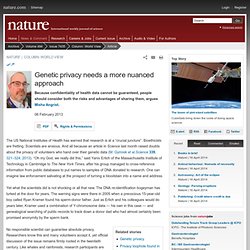
Bioethicists are fretting. Scientists are anxious. And all because an article in Science last month raised doubts about the privacy of volunteers who hand over their genetic data (M. Gymrek et al.Science 339, 321–324; 2013). “Oh my God, we really did this,” said Yaniv Erlich of the Massachusetts Institute of Technology in Cambridge to The New York Times, after his group managed to cross-reference information from public databases to put names to samples of DNA donated to research.
Yet what the scientists did is not shocking or all that new. No responsible scientist can guarantee absolute privacy. Although genetic data are considered protected health information under the HIPAA, many of the protections disappear when the information is ‘de-identified’ — that is, the 18 identifiers specified in the act (including names, addresses, birthdates and the like) are removed.
Identifying Personal Genomes by Surname Inference. Cloning A Neanderthal, Adventurous Woman Needed. RedOrbit Staff & Wire Reports – Your Universe Online Surrogacy, the act of a woman carrying a child for another person or couple, is a fairly standard and accepted practice in this day and age — unless, of course, you´re being recruited to give birth to the first Neanderthal baby in more than 30,000 years.
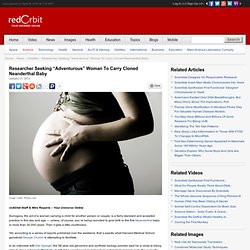
Then it gets a little unorthodox. Yet, according to a series of reports published over the weekend, that´s exactly what Harvard Medical School geneticist George Church is attempting to facilitate. In an interview with Der Spiegel, the 58-year-old genomics and synthetic biology pioneer said he is close to being able to clone a Neanderthal baby, but that he would need an “adventurous female human” to carry the currently extinct, Pleistocene-era humanoid fetus through gestation. “Reviving an extinct human ancestor may seem like a ludicrous premise, but it’s not as farfetched as it may seem,” explains Amar Toor of The Verge. So how would Church go about attempting to clone a Neanderthal? Brand Familiarity Reigns King Around the World. Breaking habits with a flash of light.
In a lab at MIT, a rat enters a T-shaped maze, hears a tone, and runs down the left arm towards a piece of chocolate.
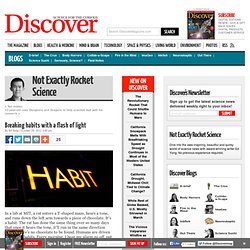
It’s a habit. The rat has done the same thing over so many days that once it hears the tone, it’ll run in the same direction even if there’s no chocolate to be found. Humans are driven by similar habits. Every morning, I hear my alarm go off, put some clothes on, and shamble into the kitchen to brew some coffee. Habits, by their very nature, seem permanent, stable, automatic.
The experiment shows that even though habits seem automatic, they still depend on ongoing supervision from the ILC and possibly other parts of the brain. “We were all stunned by how immediate and on-line these effects really are,” says Smith. New Products Have Mass Appeal Among Latin Americans. Latin Americans are hungry for new product options—more so than others around the world.
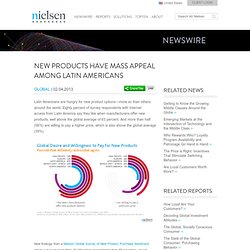
Eighty percent of survey respondents with Internet access from Latin America say they like when manufacturers offer new products, well above the global average of 63 percent. And more than half (56%) are willing to pay a higher price, which is also above the global average (39%). New findings from a Nielsen Global Survey of New Product Purchase Sentiment, which surveyed more than 29,000 online respondents from 58 countries, reveal underlying consumer sentiment toward new product innovations. Europeans and North Americans show the most trepidation when it comes to trying new product innovations.
Less than one quarter (23%) of respondents in Europe and 29 percent of respondents in North America say they are open to buying new products when they first come out. Middle East/Africa respondents are the most vocal about new product experiences. Using The Mom Blog Network to Promote your Brand. Social media guru Jeff Bullas reports that there are currently 42 million active online blogs with new blog post creation hitting the 500,000 a day mark.

Blogs are on the rise and a group of entrepreneurs at the forefront of this charge are the “The Mom Bloggers.” Solving Big-Data Bottleneck. In a study that represents a potential cultural shift in how basic science research can be conducted, researchers from Harvard Medical School, Harvard Business School and London Business School have demonstrated that a crowdsourcing platform pioneered in the commercial sector can solve a complex biological problem more quickly than conventional approaches—and at a fraction of the cost.
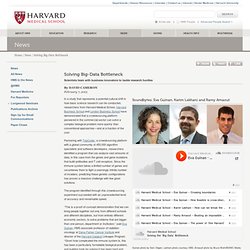
Partnering with TopCoder, a crowdsourcing platform with a global community of 450,000 algorithm specialists and software developers, researchers identified a program that can analyze vast amounts of data, in this case from the genes and gene mutations that build antibodies and T cell receptors. Since the immune system takes a limited number of genes and recombines them to fight a seemingly infinite number of invaders, predicting these genetic configurations has proven a massive challenge with few good solutions. Image by alengo/iStockphoto These findings are reported Feb. 7 in Nature Biotechnology. HOLO Magazine by HOLO. HOLO is a new magazine that explores the convergence of art, science and technology, brought to you by the team at CreativeApplications.Net (CAN).
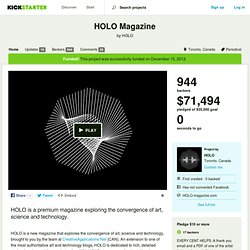
An extension to one of the most authoritative art and technology blogs, HOLO is dedicated to rich, detailed stories that demand time and attention.